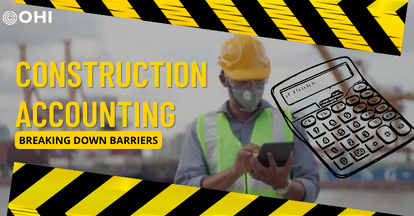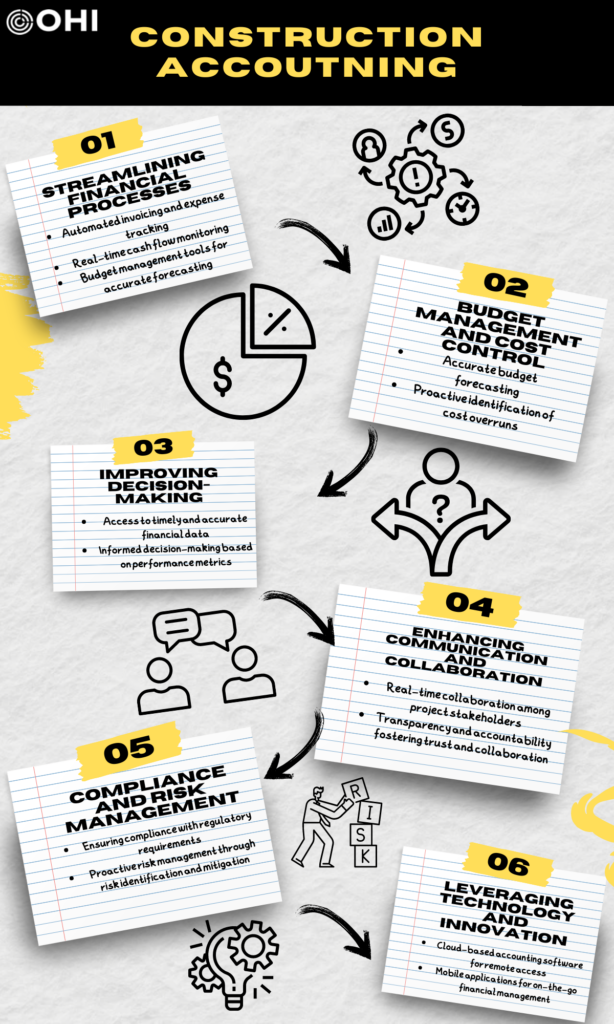
Breaking Down Barriers: How Construction Accounting Drives Efficiency
- April 26, 2024
- OHI

In the ever-evolving landscape of construction, efficiency serves as the cornerstone of success. Whether it’s managing resources, adhering to tight deadlines, or maintaining profitability, efficiency is a fundamental requirement for thriving in this competitive industry. Amidst the myriad factors influencing efficiency, construction accounting emerges as a powerful catalyst, capable of streamlining operations, optimizing financial processes, and ultimately driving project success. In this comprehensive exploration, we will delve deep into the multifaceted role of construction accounting and its profound impact on enhancing efficiency across all aspects of construction projects.

Efficient financial management lies at the heart of any successful construction project. Construction accounting involves meticulously managing finances, budgets, expenses, and revenue streams throughout the project lifecycle. By implementing robust accounting systems and leveraging cutting-edge technology, construction companies can streamline financial operations, reduce administrative burdens, minimize errors, and save valuable time. Automated invoicing, expense tracking, and budget management tools empower construction firms to efficiently monitor cash flow, track project costs, and make data-driven financial decisions in real-time, thereby enhancing overall project efficiency.
Effective budget management is crucial for maintaining project profitability and ensuring that construction projects stay within budgetary constraints. Construction accounting plays a pivotal role in facilitating accurate budget forecasting, enabling project managers to allocate resources judiciously, identify potential cost overruns proactively, and take timely corrective actions to mitigate financial risks. By closely monitoring expenses, analyzing budget variances, and adjusting financial plans as needed, construction accounting empowers project teams to exercise greater financial discipline, optimize resource utilization, and stay on track with project budgets, thus driving efficiency throughout the project lifecycle.
Informed decision-making is a cornerstone of successful project management. Construction accounting provides project stakeholders with timely, accurate, and actionable financial data, enabling them to make informed decisions that align with project objectives and financial goals. By leveraging financial insights, performance metrics, and key performance indicators (KPIs), project managers can identify areas for improvement, optimize resource allocation, mitigate risks, and capitalize on emerging opportunities, thereby enhancing project outcomes, profitability, and overall efficiency.
Effective communication and collaboration are essential for fostering seamless coordination and synergy among project stakeholders. Construction accounting serves as a catalyst for enhancing communication and collaboration by providing a centralized platform for sharing financial information, tracking project progress, and facilitating real-time collaboration among project teams, subcontractors, suppliers, and clients. By providing stakeholders with transparent access to financial data, construction accounting fosters trust, accountability, and collaboration, thereby driving efficiency and ensuring project success.
Compliance with regulatory requirements and proactive risk management are critical aspects of construction projects. Construction accounting plays a pivotal role in ensuring compliance with relevant accounting standards, tax regulations, and contractual obligations, thereby reducing the risk of legal and financial penalties. Additionally, construction accounting enables proactive risk management by identifying potential risks, assessing their impact, and implementing appropriate mitigation strategies to safeguard project interests, protect assets, and mitigate financial losses, thereby enhancing project efficiency and resilience.
Advancements in technology have revolutionized construction accounting, offering innovative solutions to enhance efficiency, productivity, and competitiveness. Cloud-based accounting software, mobile applications, and digital platforms enable remote access to financial data, facilitate real-time collaboration, and empower project teams to make informed decisions on the go. Furthermore, emerging technologies such as artificial intelligence (AI) and machine learning (ML) are being leveraged to automate routine accounting tasks, analyze large datasets, identify patterns, and generate actionable insights, thereby driving efficiency, accuracy, and innovation in construction accounting processes.
Continuous improvement is imperative for staying ahead in the fast-paced and ever-changing construction industry. Construction accounting enables companies to identify areas for improvement, assess performance metrics, and implement process enhancements to drive ongoing efficiency gains. By embracing innovation, leveraging technology, and adapting to evolving industry trends, construction firms can optimize their accounting practices, enhance operational efficiency, and maintain a competitive edge in the market, thereby driving continuous improvement, innovation, and success in construction projects.
Efficient resource management is essential for maximizing productivity and minimizing waste in construction projects. Construction accounting enables companies to track and analyze resource utilization, identify inefficiencies, and optimize resource allocation to ensure that materials, equipment, and manpower are deployed effectively. By aligning resource allocation with project requirements and timelines, construction accounting helps streamline operations, reduce idle time, and enhance overall project efficiency.

Effective time and labor management are critical for meeting project milestones and deadlines. Construction accounting provides tools and processes for tracking labor costs, monitoring work hours, and managing labor productivity. By capturing accurate data on labor expenses and productivity levels, construction companies can identify opportunities to streamline workflows, improve scheduling, and eliminate bottlenecks, thereby optimizing project timelines and enhancing efficiency.
Maintaining high-quality standards is essential for delivering successful construction projects. Construction accounting facilitates quality control and assurance by tracking project costs, monitoring material usage, and analyzing construction defects or rework. By identifying quality issues early in the project lifecycle, construction companies can take corrective actions, implement process improvements, and ensure that projects meet or exceed quality standards, thereby reducing rework, minimizing delays, and enhancing overall project efficiency.
Effective management of suppliers and vendors is crucial for securing timely delivery of materials and services at competitive prices. Construction accounting provides tools for managing supplier contracts, tracking purchase orders, and monitoring supplier performance. By establishing transparent communication channels and enforcing contractual agreements, construction companies can build strong relationships with suppliers, negotiate favorable terms, and mitigate supply chain risks, thereby enhancing efficiency and reliability in project delivery.
In today’s environmentally conscious world, construction projects must adhere to sustainability standards and minimize environmental impact. Construction accounting plays a vital role in promoting environmental sustainability by tracking resource consumption, monitoring waste generation, and analyzing carbon emissions. By implementing sustainable practices, adopting green technologies, and optimizing resource utilization, construction companies can reduce their ecological footprint, comply with regulatory requirements, and enhance their reputation as responsible corporate citizens, thereby driving efficiency and sustainability in construction projects.
In conclusion, construction accounting serves as a linchpin for driving efficiency and success in construction projects. By optimizing resource allocation, managing costs, enhancing quality control, streamlining supplier management, promoting environmental sustainability, and fostering stakeholder engagement, construction accounting empowers companies to achieve greater efficiency, profitability, and sustainability in their projects. As construction projects become increasingly complex and challenging, construction accounting will continue to play a pivotal role in overcoming barriers, maximizing efficiency, and delivering successful outcomes in the construction industry
Contact us for a customized NO OBLIGATION proposal for outsourcing your accounting activities.







